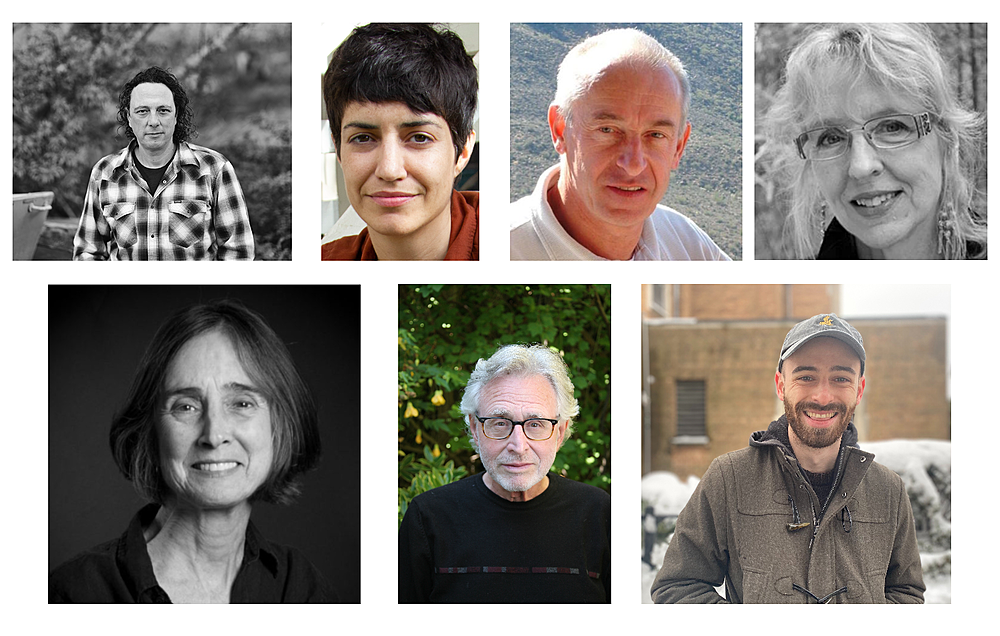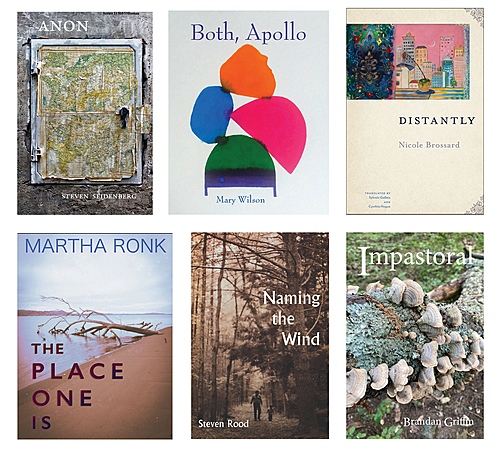Omnidawn Spring Book Launch
Booksmith / Virtual Events
Free Event
No upcoming date/times for this event.

Booksmith and The Bindery are pleased to host a virtual event with Omnidawn Publishing for their seasonal launch of new titles, for which each author will be reading from their work. Be the first to own these new treasures:
Anon by Steven Seidenberg
Both, Apollo by Mary G. Wilson (winner of the Omnidawn chapbook contest, selected by Victoria Chang)
Distantly by Nicole Brossard, translated by Sylvain Gallais and Cynthia Hogue
Impastoral by Brandan Griffin (winner of the Omnidawn Open Book contest, selected by Brian Teare)
Naming the Wind by Steven Rood
The Place One Is by Martha Ronk
This event is free and all ages, but RSVP is required. Event link will be sent to everyone who registers.
About Anon by Steven Seidenberg
The narrator of Anon opens the sluice gates of embittered confession and philosophical reproach to release a flood of extravagant lyricism. These poems at first submerge readers in the ecstatic rhythms of its music, then they turn to address the tropes of narrative, inviting readers to join in pursuit of major themes of the human condition. Steven Seidenberg employs a characteristically aphoristic style to manage multiple lines of inquiry at once. The resultant fragments navigate between testament and treatise, storyline and system, and in a manner that echoes the speculative vehemence of Samuel Beckett, Clarice Lispector, and Maurice Blanchot.
Steven Seidenberg's other works include plain sight (Roof Books | 2020), Situ (Black Sun Lit | 2018), Null Set (Spooky Actions Books | 2015), and Itch (RAW aRT Press | 2013). He is also the author of the photo monographs Pipevalve: Berlin (Lodima | 2017) and The Architecture of Silence: Abandoned Lives of the Italian South (Contrasto | 2022).
To have Anon sent to your door, order here.
About Both, Apollo by Mary G. Wilson
Mary Wilson's Both, Apollo speaks from inside the bodies and binaries that so often act as constraints. It sometimes tries to negotiate its way out. It laments, celebrates, reasons, jokes, and occasionally begs. It runs into a wall and hugs it, offers it pizza, and speeds through grammars and cities until dizziness catapults it from the grid. It tries to queer the echoes of its language in the hope that a rhyme might break the logic of "either/or" and give rise to "both/and."
Both, Apollo is a love poem to whatever has the grace to appear, quietly finding hope. Moments of humor and tenderness accompany the speaker with each act of crossing and circling back. The poems in Both, Apollo are constantly in flux, and Wilson's lyricism acts as a teaching tool for using both the real and the imagination to guide us in moment-by-moment navigation of our world.
Both, Apollo won the Omnidawn Chapbook contest, selected by Victoria Chang.
Mary G. Wilson earned an MFA from Brown University and is currently completing a PhD in English at the University of California, Berkeley. She co-curated the Holloway Series in Poetry from 2016-2018, and she is the author of the chapbook “Not Yet” (Projective Industries, 2019). Her poetry has appeared in Coconut, Anomalous, Typo, Paperbag, the Scores, Elderly, and elsewhere.
To have Both, Apollo sent to your door, order here.
About Distantly by Nicole Brossard, translated by Sylvain Gallais and Cynthia Hogue
This bilingual edition of Nicole Brossard's lyrical poetry is a sequence of lush, taut cityscapes. Known for her elliptical and materially grounded poetics, Brossard creates an intimate series of poems drawn loosely from urban experience. The poems comprise an evocative distillation of postmodern urban life with a sharp sense of cultural and gendered histories of violence and beauty and struggles for survival and intimacy. The poems capture the emotional and ecological surroundings of each city and its people. The cities in Brossard's poems feel surreal and in them dwell survivors of "misfortunes," living in urban landscapes with their "gleaming debris" and "bridges, ghats, / rivers in a time of peace and torture." These poems gesture toward a transmuted social context and toward a quest "to meet the horizon the day after the horizon."
Sylvain Gallais is a native French speaker transplanted to the U.S. twenty years ago. He is an emeritus professor of Economics at Université Francois Rabelais (Tours, France) and of French in the School of International Letters and Culture at Arizona State University. His co-authored book in economics is entitled France Encounters Globalization (2003).
Cynthia Hogue’s tenth collection of poetry, instead, it is dark, will be out in 2023. With Sylvain Gallais, she translated Fortino Sámano (The overflowing of the poem), from the French of Virginie Lalucq and Jean-Luc Nancy, which won the Landon Translation Award from the Academy of American Poets, and Joan Darc, by Nathalie Quintane. Hogue’s honors include two NEA Fellowships and the Witter Bynner Translation Fellowship. She is the inaugural Marshall Chair in Poetry Emerita Professor of English at Arizona State University.
To have Distantly sent to your door, order here.
About Impastoral by Brandan Griffin
The expansive reworking of language in Impastoral flies through the possible voices of outsides and insides – slug, probe, horse carriage, sewer, potted plant, lab rat, vampire, bot fly, giant cow. Language, in Brandan Griffin's poetry, is neither human nor nonhuman, and it undoes that very idea of these distinctions, so beings – slugprobe, pottedhorsesewer, telepathybarcode, mammaltexts – morph and change in between boundaries.
Each of these poems is an organism, a collection of living connections, looped interiorities strung together in worlds tunneling through worlds. The poems' composition becomes a decomposition of budding, breeding, and fluctuating. Reading this collection is an experience of becoming deformed and merged into the experiences of other beings; you are sea vent, microprocessor, cell gel, bug, a greenly translucent leaf typed half a sound at a time. Griffin invites us to imagine all possible beings and to hatch into a fresh world.
Impastoral won the Omnidawn Open Book contest, selected by Brian Teare.
Brandan Griffin was born in Massachusetts and now lives in Sunnyside, New York. He studied English at Harvard University and has an MFA from Columbia. He has written a chapbook called Four Concretures (Theaphora Editions), and some of his poems have been published in Tagvverk, Chicago Review, and Word for/Word. Impastoral is his first full-length book.
To have Impastoral sent to your door, order here.
About Naming the Wind by Steven Rood
Wind moves through this collection, opening the poems to the dying beauty of the natural world, to the weathers inside the psyche and without, and to the connections between a family and between the speaker and his mentor, the great poet Jack Gilbert. The collection navigates the intimacies of human relationships with others, the challenges of working as a lawyer trying to maintain integrity as others fall prey to corporate greed, and the complexity of holding a Jewish identity while being awake to tradition's hold on the mind and its cost. Steven Rood offers a powerful account of how to be a human in dynamic relationships while also holding respect for the non-human beings that comprise most of the life on our planet.
Rood employs structures and forms that directly relate to the content of the poems themselves. Spontaneous breaks and starts reflect the writer's turns of mind, offering readers insight into the meaning and measure of the work.
Steven Rood was born in Los Angeles, attended Hollywood H.S. and U.C. Berkeley, and is a practicing trial lawyer. He has studied classical guitar for decades. For 15 years he was a friend and poetry student of Jack Gilbert, until Jack’s death. An earlier iteration of Steven Rood’s manuscript was a 2019 National Poetry Series Finalist. His poems appear in Periodicities, Sporklet, Quarterly West, Marin Poetry Center Anthology, Fugue, Lyric, Hayden’s Ferry Review, Tar River Poetry, New Letters, The Marlboro Review, The Atlanta Review, The Southern Poetry Review, Notre Dame Review, and elsewhere. He lives in Berkeley with his spouse, the poet and Jewish Feminist liturgist, Marcia Falk. Their son, Abraham, teaches high school English in Oakland to newly arrived immigrants from Mexico and Central America.
To have Naming the Wind to your door, order here.
About The Place One Is by Martha Ronk
The Place One Is explores the intersection of person and place, the ways in which changes in the tangible world alter one's vision, bodily posture, vocabulary, and concern for – to take one example – the dwindling water supply in California. The body's position, its geometry, and the topography of the surrounding land become less and less recognizable as body and world blend together. Gravel giving way underfoot mirrors the way that words dissolve into mumbles, and the skeleton of a rusty car on the sand appears like one's own skeleton. Ronk shows that disintegration here is disintegration there. These poems also wonder at interdependence, considering how lines intersect and continue to connect us to the sea – and to islands, lagoons, greenery, sky, and space.
In the first part of the collection, the poems focus on a rural landscape, and in the second part, they consider the overly bright urban world of Los Angeles.
Martha Ronk is the author of twelve books of poetry and one of short stories, Glass Grapes. Her poetry books include Silences (Omnidawn 2019), Ocular Proof (on photography), Transfer of Qualities (2013, long-listed for the National Book Award), Vertigo (Coffee House Press, a National Poetry Series Selection 2007), Partially Kept (Nightboat books), in a landscape of having to repeat (PEN USA best poetry book), Eyetrouble, and Why/Why Not (on Hamlet, University of CA Press). Her work has been included in the anthologies Lyric Postmodernisms, American Hybrid, Not for Mothers Only, and most recently North American Women Poets in the 21st Century, Wesleyan University Press 2020). She worked as editor for Littoral Books and The New Review of Literature, and is the emeritus Irma and Jay Price Professor of English at Occidental College in Los Angeles where she taught Renaissance Literature and creative writing.
To have The Place One Is to your door, order here.
--
This event is free and all ages, but RSVP is required.
Authors are pictured above as listed, clockwise from top left.

